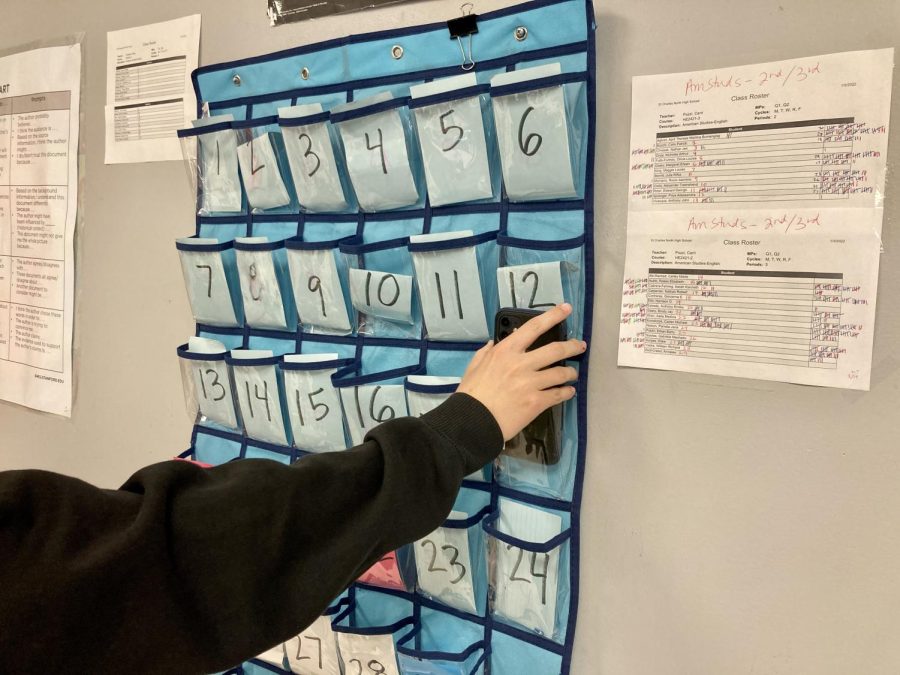Phone Usage Increasing During Class Time
Phone caddies offer a solution, though teachers hope to avoid needing to use them.
April 29, 2022
An increase in phone usage by students during class has been observed by staff and students throughout this year. As we continue on our path back to normalcy, school members have noticed more students on their phones during class.
“I think that […] people have increased the usage of their phones,” said Zoey Gonzalez, freshman.
Even though COVID-19 cases have been on the decline, life during the pandemic has impacted how people communicate.
“[Using our phones] was our only way of communication during the pandemic,” said Dalaynin Arnold, freshman.
COVID-19 isn’t the only reason for phone usage during class; the time of year could also be a factor.
“The end of the year is when no one cares anymore, they just want school to be over,” said Arnold. “Phone usage in the beginning of the year versus the end has changed.”
According to the Pew Center, about 95% of teens in the United States report having access to a smartphone, with about 45% reporting that they are almost always using the internet.
“I think that because of the nature of smartphones, I mean they’re designed to be addictive and so I think their design has been successful,” said Lindsay Boynton, social studies teacher. “It’s harder and harder and harder for students to resist checking or using them.”
Some notice that phone usage during class seems to differ depending on the grade level..
“To me, the most noticeable difference is age. My seniors are [on their phones] significantly less than my younger students,” said Boynton.
As younger students try to adjust to a new environment, it’s been observed that they can turn to their phones for help.

“It depends on what grade level you’re in too. I’ve seen freshmen and seniors on their phones the most. Freshmen because they’re new and [trying to] find stuff to do,” said Gonzalez.
One solution has proven to be effective in getting students off of their phones, even if not every student is happy about it.
“We have the phone caddies, but we don’t really have a building policy on when or how to use them, except during exams,” said Boynton. “I use the phone caddies during work days because I’ve noticed that [work days] increase the amount of people using their phones since there’s less structure.”
This might not be a permanent solution, though, because students rely on their phones to contact parents or complete schoolwork.
“I have also had classes in the past where if we ask them to put their phones on the wall they get mad and refuse to speak,” said Boynton. “And that is definitely a new behavior in the last couple of years.”
All in all, students’ education is more important than playing on an app or watching videos throughout class time, even if it is more entertaining. Teachers can make every single lesson as entertaining as a phone, which can lead to boredom.
“I think that [phones out during class] is a sign of boredom, I also think it kind of sucks because people don’t physically speak to each other a lot anymore,” said Arnold.
When students continuously use their phones during class, it can harm how well they do in school. According to The Pew Center, roughly 54% of teens express concerns about being on their phones too much.
Teachers hope that eventually students will manage themselves, instead of relying on teacher instruction.
“I think that ultimately, I would like students to learn how to self regulate with their phones,” said Boynton.




John Doe • May 2, 2022 at 11:20 am
None of this is new. It has nothing to do with the pandemic and it’s not a new behavior. The article you used clearly shows this since it was published in 2018. Their are articles covering the same topic from before that. Nothing has changed, except for maybe the phone model. The hope that students will self-regulate is a nice one, but it is ultimately unrealistic. Reglations need to be enforced.